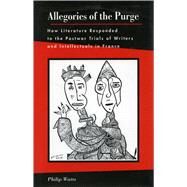Allegories of the Purge
, by Watts, Philip- ISBN: 9780804731850 | 0804731853
- Cover: Paperback
- Copyright: 1/1/1999
This book is about four writersSartre, Eluard, Blanchot, and Celinewhose works confront and respond to the purge of collaborationist intellectuals in postwar France. It investigates how their writing argues for or against the different positions outlined during the purge and how it reflects or distorts the competing theories about literature to emerge from the trials. These writers were themselves involved in the trials to varying degrees: Celine was accused of treason, though eventually condemned on a lesser charge; Eluard, one of the leading Resistance poets and a Communist, published in the clandestine Resistance press and devoted a number of his poems to condemning collaborators; Sartre's theory of committed literature reiterates the theme of the writer's responsibility as presented during the trials; as for Blanchot, if his work never directly comments upon the purge, its arguments for the autonomy of literature are both a response to Sartre and a commentary on what Blanchot called the "trial of art." In their reactions to the purge, these writers mobilized a number of discourses, ranging from the historical, economic, and literary to the sexual, medical, and corporeal. To understand their views on the trials, it is useful to read their texts as allegories of the purge. At one point or another they all speak about the purge through a series of metaphoric substitutions maintained through an extended narrativewhether this narrative is a critical essay, a novel, or a collection of poems. The texts also give the reader a code for reading them allegorically, and this code is the purge archive, whose records, debates, and arguments reshaped the way writers understood their craft.







